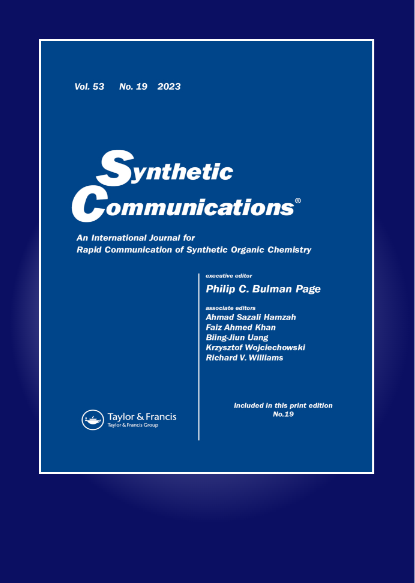Synthesis, antiproliferative activity, and in silico studies of quinoline-based pyrimidinedione and thiazolidinedione derivatives
IF 1.8
3区 化学
Q3 CHEMISTRY, ORGANIC
引用次数: 0
Abstract
Cancer affects millions of people worldwide. PDK1 enzyme (co-crystallized with BIM-1) controls the proliferation of breast cancer cells. Aiming to resemble BIM-1’s binding, quinoline-based pyrimidinediones and thiazolidinediones were synthesized starting from 2-chloro-3-formylquinoline. Compared with doxorubicin (reference), in vitro antiproliferative activity against MCF7 and HCT116 cancer cell lines showed the most potency of thiobarbiturate 3 and thiazolidinedione 4. In silico molecular docking, DFT, and pharmacokinetics simulations supported the findings. The docking analysis toward PDK1 enzyme showed that most amino acids interacting with co-crystallized ligand (BIM-1) were successfully bonded to our docked substances, especially thiobarbiturate 3 with highest S-score closer to BIM-1. In DFT calculations, this compound exhibited the lowest energy gap and highest softness leading to more response to radical surface interactions. The compounds with significant antiproliferative activity exhibited high electrophilicity values. ADME analysis showed its desirable drug-likeness and oral bioavailability. This work may contribute to developing new potent antiproliferative agents.
基于喹啉的嘧啶二酮和噻唑烷二酮衍生物的合成、抗增殖活性及硅学研究
癌症影响着全球数百万人。PDK1 酶(与 BIM-1 共同结晶)控制着乳腺癌细胞的增殖。为了类似于 BIM-1 的结合,研究人员从 2-氯-3-甲酰基喹啉开始,合成了喹啉基嘧啶二酮和噻唑烷二酮。与多柔比星(参照物)相比,硫代巴比妥酸 3 和噻唑烷二酮 4 对 MCF7 和 HCT116 癌细胞株的体外抗增殖活性最强。硅学分子对接、DFT 和药代动力学模拟证实了这些发现。与 PDK1 酶的对接分析表明,与共晶体配体(BIM-1)相互作用的大多数氨基酸都成功地与我们对接的物质结合在一起,尤其是硫代巴比妥酸 3,其 S 分数最高,更接近 BIM-1。在 DFT 计算中,该化合物表现出最低的能隙和最高的软度,因此对自由基表面相互作用的响应更强。具有显著抗增殖活性的化合物表现出较高的亲电性。ADME 分析表明,该化合物具有理想的药物亲和性和口服生物利用度。这项工作可能有助于开发新的强效抗增殖剂。
本文章由计算机程序翻译,如有差异,请以英文原文为准。
求助全文
约1分钟内获得全文
求助全文
来源期刊

Synthetic Communications
化学-有机化学
CiteScore
4.40
自引率
4.80%
发文量
156
审稿时长
4.3 months
期刊介绍:
Synthetic Communications presents communications describing new methods, reagents, and other synthetic work pertaining to organic chemistry with sufficient experimental detail to permit reported reactions to be repeated by a chemist reasonably skilled in the art. In addition, the Journal features short, focused review articles discussing topics within its remit of synthetic organic chemistry.
 求助内容:
求助内容: 应助结果提醒方式:
应助结果提醒方式:


